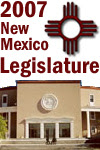 After tacking an amendment on to one and completely rewriting another, the Senate has approved two of the proposals on the special session agenda.
After tacking an amendment on to one and completely rewriting another, the Senate has approved two of the proposals on the special session agenda.
Senators approved House Bill 6, which would expand the public financing system to include judicial elections, but amended it to take affect only if voters remove the state’s retention system and subject judges to a competitive election process.
They also approved House Bill 2, which would have provided $208 million for road projects around the state, but only after scaling it back and reworking it.
The House must come back and consider the changes made by the Senate. That chamber is scheduled to convene at noon on Friday.
Today’s action by the Senate came after it twice voted to adjourn the session without considering any of the proposals. Gov. Bill Richardson called today’s news a victory.
 “I am pleased that the Senate took the time to debate and take action on two pieces of our agenda,”
“I am pleased that the Senate took the time to debate and take action on two pieces of our agenda,”
The decision to consider the bills came after the Senate took a break this afternoon so Sen. John Arthur Smith, D-Deming, and Leonard Lee Rawson, R-Las Cruces, could negotiate with
The bill, dubbed Governor Richardson’s Improvement Plan – or GRIP – II, has been controversial in the Senate for the past two years because GRIP I is some $300 million over budget. The original version of GRIP II, which has been approved by the House in the special session, would have funded $208 million in road projects through the sale of bonds.
The new bill funds about $108 million in road projects with existing money, so no debt is incurred. There was money left over from this year’s regular session because of vetoes by
The amended bill was approved on a vote of 24-12.
“This is a true compromise,” Smith said. “Now we have money going to where there are legitimate needs.”
Spaceport road funded, commuter rail not
 The new road bill provides $10 million for a road to Spaceport America, whereas the original version of the bill would have provided $25 million. It also provides $25 million to help fund unfinished GRIP I state road projects and $75 million to fund some city and county road projects proposed in the original GRIP II bill. Funds for maintenance of state highways are also included.
The new road bill provides $10 million for a road to Spaceport America, whereas the original version of the bill would have provided $25 million. It also provides $25 million to help fund unfinished GRIP I state road projects and $75 million to fund some city and county road projects proposed in the original GRIP II bill. Funds for maintenance of state highways are also included.
In addition, the new version of the bill dictates that projects will be funded as they are ready and local match money becomes available. The lack of such a provision in GRIP I allowed the Richardson Administration to spend the funds in any order it saw fit.
The bill also prevents the money from being spent on the
 “We’re not putting more money into the railroad,” Rawson said.
“We’re not putting more money into the railroad,” Rawson said.
Smith said he was glad the Senate agreed to provide some money for the spaceport road in advance of Tuesday’s election in
“We send a message to the voters that we’re behind this,” he said.
Smith said the funding will be enough to help the spaceport project proceed. When the Legislature convenes again in January, it can decide whether the addition $15 million is needed, he said.
Campaign finance, feed bills approved
The campaign finance bill was approved, but not before the Senate tacked on a Rawson-proposed amendment that makes the bill only take affect if voters eliminate the retention system for judges.
Currently, state judges face only one competitive election, then run for retention after that. Many are appointed before their competitive election, giving them the advantage of incumbency. Rawson said the retention system doesn’t provide competition, so there’s no need for public financing.
If voters opt to change the system to one of competition, public financing would kick in under the version of the bill approved 20-15 by the Senate.
The Senate also approved the feed bill. Tacked on to it was a Rawson amendment dictating that lawmakers will only be paid per diem during the special session for days they actually worked, so days a chamber is in recess won’t count.
What will House do?
 Smith said Speaker of the House Ben Lujan was not involved in today’s negotiations, so he doesn’t know what the House will do with the proposals when it convenes at noon on Friday.
Smith said Speaker of the House Ben Lujan was not involved in today’s negotiations, so he doesn’t know what the House will do with the proposals when it convenes at noon on Friday.
“We’re hoping that the House will take it,” Smith said, adding he believes the Senate will vote to adjourn sine die over and over again if the House doesn’t.
Rawson doesn’t think that will be necessary.
“I think the House will agree with them,” Rawson said.
A prior version of this posting incorrectly stated that the new road bill provides $25 million for GRIP II projects.